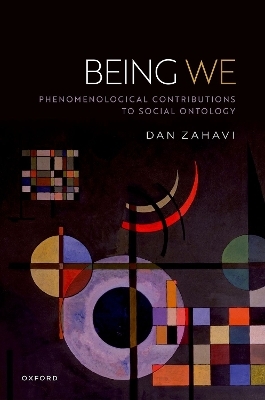
Being We
Phenomenological Contributions to Social Ontology
Seiten
2025
Oxford University Press (Verlag)
978-0-19-289448-9 (ISBN)
Oxford University Press (Verlag)
978-0-19-289448-9 (ISBN)
- Noch nicht erschienen (ca. Januar 2025)
- Versandkostenfrei innerhalb Deutschlands
- Auch auf Rechnung
- Verfügbarkeit in der Filiale vor Ort prüfen
- Artikel merken
The we is an integral part of everyday life: We solve tasks, reach decisions, and share emotions together, just as we can share a collective identity, traditions and customs. What is the nature of this we? The book discusses this question by drawing on insights from not only philosophy, but also sociology, anthropology, and social psychology.
What does it take to constitute a we with others and how does feeling, thinking, and acting as part of a we, transform one's sense of self, one's relation to others, and the way one experiences the world? Is individual subjectivity something that necessarily requires a communal grounding or does a we-relationship always presuppose a plurality of pre-existing selves? What kind of understanding of and relation to others is required if a we is to emerge? Questions regarding the ontological, epistemological, and social character of we is not only of contemporary societal relevance, but are also questions that were intensively discussed by early phenomenological philosophers such as Husserl, Reinach, Stein, Scheler, Walther, Gurwitsch, and Schutz.
Drawing on and engaging with ideas and distinctions found in these historical resources, Being We combines historical scholarship and systematic theorizing. It breaks new ground by interweaving work on selfhood and first-personal experience, social cognition, and collective intentionality, offers a much-needed cross fertilization between philosophy and theoretical considerations in the social sciences (sociology, anthropology, and social psychology), and provides a novel account of the complex interrelation between we, you, and I.
What does it take to constitute a we with others and how does feeling, thinking, and acting as part of a we, transform one's sense of self, one's relation to others, and the way one experiences the world? Is individual subjectivity something that necessarily requires a communal grounding or does a we-relationship always presuppose a plurality of pre-existing selves? What kind of understanding of and relation to others is required if a we is to emerge? Questions regarding the ontological, epistemological, and social character of we is not only of contemporary societal relevance, but are also questions that were intensively discussed by early phenomenological philosophers such as Husserl, Reinach, Stein, Scheler, Walther, Gurwitsch, and Schutz.
Drawing on and engaging with ideas and distinctions found in these historical resources, Being We combines historical scholarship and systematic theorizing. It breaks new ground by interweaving work on selfhood and first-personal experience, social cognition, and collective intentionality, offers a much-needed cross fertilization between philosophy and theoretical considerations in the social sciences (sociology, anthropology, and social psychology), and provides a novel account of the complex interrelation between we, you, and I.
Dan Zahavi is Professor of Philosophy and Director of the Center for Subjectivity Research at the University of Copenhagen. Zahavi's primary research area is phenomenology and philosophy of mind, and their intersection with empirical disciplines such as psychiatry and psychology. In addition to various scholarly works on the phenomenology of Husserl, Zahavi has mainly written on the nature of selfhood, consciousness, self-consciousness, intersubjectivity, empathy, and most recently on topics in social ontology. His work has been translated into more than 30 languages.
| Erscheint lt. Verlag | 30.1.2025 |
|---|---|
| Verlagsort | Oxford |
| Sprache | englisch |
| Maße | 156 x 234 mm |
| Themenwelt | Geisteswissenschaften ► Philosophie ► Metaphysik / Ontologie |
| Geisteswissenschaften ► Psychologie ► Sozialpsychologie | |
| ISBN-10 | 0-19-289448-X / 019289448X |
| ISBN-13 | 978-0-19-289448-9 / 9780192894489 |
| Zustand | Neuware |
| Informationen gemäß Produktsicherheitsverordnung (GPSR) | |
| Haben Sie eine Frage zum Produkt? |
Mehr entdecken
aus dem Bereich
aus dem Bereich
eine philosophische Reise
Buch | Softcover (2024)
Goldmann (Verlag)
14,00 €


